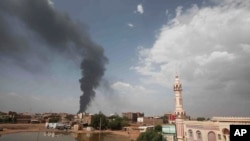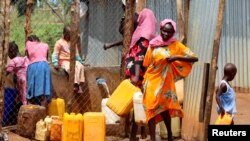Spokeswoman Margaret Harris of the World Health Organization appealed to the global community to do more, saying at a U.N. briefing in Geneva: “The world is ignoring the dire needs.”
Sudan was plunged into chaos in April when months of simmering tensions between the military, led by Gen. Abdel Fattah Burhan, and the Rapid Support Forces, commanded by Mohammed Hamdan Dagalo, exploded into open fighting in Khartoum and elsewhere. Since then, the U.N and rights groups have accused both the military and the RSF of numerous human rights violations, although both forces have rejected these accusations.
In Darfur — the scene of genocidal war in the early 2000s — the fighting has morphed into ethnic violence, with the RSF and allied Arab militias targeting African communities in the western region, U.N. officials say.
Meanwhile Sudan's capital, Khartoum, has been reduced to an urban battlefield. Across the city, RSF forces have commandeered homes and turned them into operational bases, residents and doctors groups say. The army, in turn, has struck residential areas from the air and ground with artillery fire.
A host of U.N. organizations specializing in health, migration, refugees, human rights and food were among those who joined the call, saying that their two appeals for financial support — for a total of more than $3 billion — are less than 27% funded.
The heads of the 20 global organizations pointed out that "more than six million Sudanese people are one step away from famine."
"The situation is spiraling out of control," said the statement, signed by the heads of numerous United Nations agencies, along with organizations including Save the Children and CARE.
At least 4,000 people are estimated to have been killed, said Liz Throssell, a spokeswoman for the U.N. human rights office. Activists and doctors on the ground say the death toll is likely far higher.
The conflict has displaced more than 4.3 million people, including some 3.2 million within the country, said William Spindler, a spokesman for the UNHCR refugee agency.
Throssell said the U.N. has documented at least 28 incidents of rape, but that is believed to be fewer than the actual number.
"Men in RSF uniform were implicated in at least 19 incidents as perpetrators," U.N. rights chief Volker Turk said in a statement.
Earlier this month, Amnesty International accused both sides of committing extensive war crimes, including deliberate killings of civilians and mass sexual assault. The group said almost all rape cases were blamed on the RSF and its allied Arab militias.
The U.N. humanitarian aid coordinator said its appeal for $2.57 billion for aid into Sudan has received only $651 million, while UNHCR said its appeal for $566 million has brought in just under $175 million.
“For four gruesome months, the people of Sudan have been engulfed in a war that is destroying their lives and their homeland and violating their basic human rights,” leaders of the organizations said in a joint statement.
“People are dying because they cannot access health care services and medicine. And now, because of the war, Sudan’s children are wasting away for lack of food and nutrition,” it said.
Previous attempts to halt the violence failed. There have been at least nine cease-fire agreements between the warring parties, brokered largely by Washington and Riyadh in the Saudi Arabian city of Jeddah during May and June, but all foundered.
Information for this report came from The Associated Press and AFP.


Forum